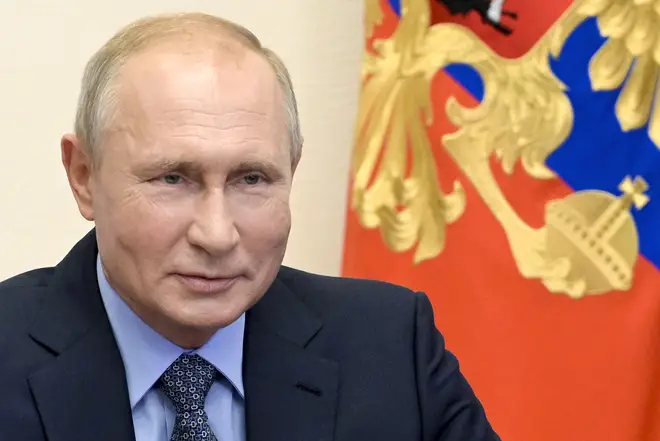
Shelagh Fogarty 1pm - 4pm
21 July 2020, 10:50 | Updated: 21 July 2020, 15:54

Russia poses a ‘significant threat to the UK’ on multiple fronts including espionage, interference in democracy and serious crime, according to the long-awaited 'Russia Report' that was released today.
The Intelligence and Security Committee report states: "It is clear that Russia currently poses a significant threat to the UK on a number of fronts – from espionage to interference in democratic processes, and to serious crime.
"The question is how that has happened – and what the Intelligence Community is now doing to tackle it."
"Russia's cyber capability, when combined with its willingness to deploy it in a malicious capacity, is a matter of grave concern, and poses an immediate and urgent threat to our national security."
READ MORE: Explained - What were the key points in the 'Russia Report'?
The key findings are:
- It is not possible to say whether Russia interfered in the Brexit referendum because the government failed to look into the matter
- Questions raised on whether the government took its eye off the ball on Russia, underestimating the Russian threat and saying they are still playing catch-up
- Russian influence in the UK is ‘the new normal’ with oligarchs’ money and illicit funds recycled through a London ‘laundromat’
- The government needs to speak to social media firms to tackle ‘hostile state use of their platforms’
- The UK is a high priority target for Russian interference, disinformation and cyber attacks
- The report also criticises the government for failing to properly assess and counter the threat Russia posed to the Scottish independence vote.
The report said GCHQ had advised that Russian actors had "orchestrated phishing attempts against Government departments", including against the Foreign Office and the Defence Science and Technology Laboratory (DSTL) during the early stages of the investigation into the Salisbury attacks in 2018.
It also says Russians with "very close links" to Vladimir Putin were "well integrated into the UK business, political and social scene".
It states it would however be "difficult - if not impossible - to prove" allegations Russia sought to influence the 2016 Brexit referendum but "the Government was slow to recognise the existence of the threat".
The Government said there was "no evidence" of successful Russian interference in the Brexit vote but the committee - which oversees the work of Britain's spies - suggested that there was no proper investigation.
The Government - led by prominent Brexiteer Boris Johnson - has rejected the committee's call for a full analysis of whether Vladimir Putin's government did attempt to influence the result of the 2016 vote.
Russia also sees the UK as one of its top targets in the West, according to the report.
The Intelligence and Security Committee, who released the report, also questioned whether the Government "took its eye off the ball" on Russia and is still playing catch-up to this day.

Ben Kentish explainer of the Russia report
Parliament's Intelligence and Security Committee said in releasing the report: "The UK is one of Russia’s top Western intelligence targets: particularly given the UK’s firm stance against recent Russian aggression and the UK-led international response to the 2018 Salisbury attack.
"Russia’s intelligence services are disproportionately large and powerful and, given the lack of rule of law, are able to act without constraint. The fusion between state, business, and serious and organised crime provides further weight and leverage: Russia is able to pose an all-encompassing security threat – which is fuelled by paranoia about the West and a desire to be seen as a resurgent great power.
“Russia is a highly capable cyber actor, employing organised crime groups to supplement its cyber skills. Russia carries out malicious cyber activity in order to assert itself aggressively - for example, attempting to interfere in other countries’ elections. It has also undertaken cyber pre-positioning on other countries’ Critical National Infrastructure.
"Given the immediate threat this poses to our national security, we are concerned that there is no clear coordination of the numerous organisations across the UK intelligence community working on this issue, this is reinforced by an unnecessarily complicated wiring diagram of responsibilities amongst Ministers."
The Government has denied the suggestion it had "badly underestimated" the Russian threat.
Foreign Secretary Dominic Raab said: "We've been clear that Russia must desist from its attacks on the UK and our allies.
"We will be resolute in defending our country, our democracy and our values from such hostile state activity."
Shadow Foreign Secretary, Lisa Nandy MP said: “It is extraordinary that the Prime Minister, Boris Johnson, took the political decision last October ahead of the General Election to block the publication of this important report that systematically goes through the threat Russia poses to the UK’s national security.
“The report is very clear that the Government has underestimated the response required to Russia and it is imperative we learn the lessons from the mistakes that have been made.
“The Labour Party calls on the Government to study the conclusions of the report carefully and take the necessary steps to keep our country safe.”
Labour MP and ISC member Kevan Jones said the Government needed to have a policy in place that protects the UK's democratic process.
He added: "One of the great strengths would have been actually in doing an investigation, because if the Government had done that at least then it could have looked for vulnerabilities, looked for things, and been able to change them. It chose not to do that."
Liberal Democrats acting leader Sir Ed Davey accused Boris Johnson of refusing "a cross-party call to launch an inquiry because he is worried about what it might find".
"This is a green light for Russia to interfere with our democracy in future, knowing there will be no consequences," he tweeted.